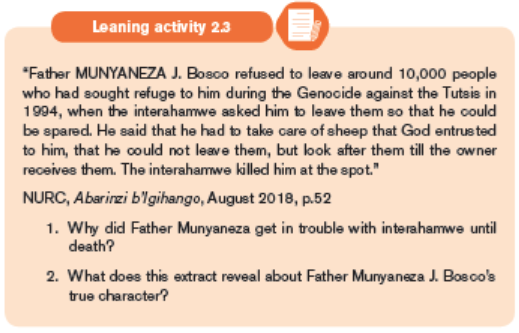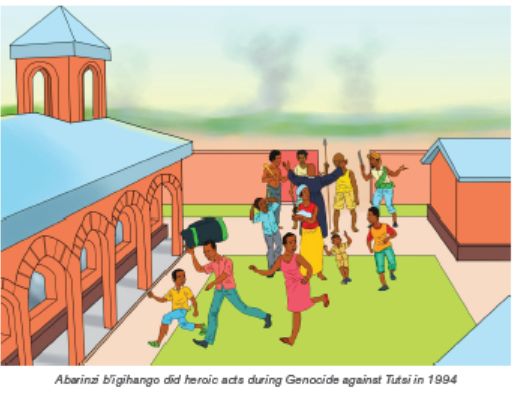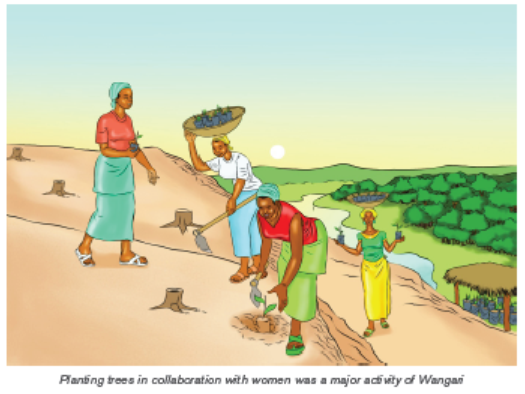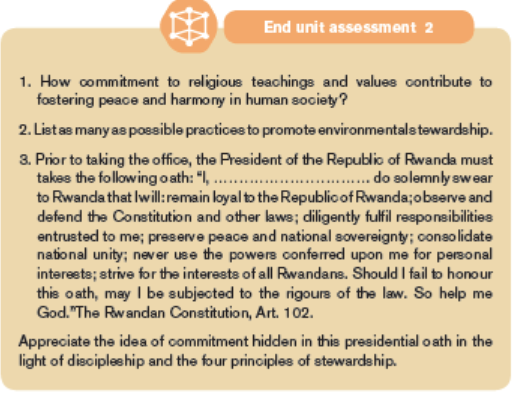UNIT 2: VALUES AND COMMITMENT TO RELIGIOUS TEACHINGS
Key Unit competence:Practice values and commitment to religious teaching in his or her daily life

2.1 Commitment: Discipleship and Stewardship
A religion binds its followers to beliefs in someone or something in which or
whom they put complete trust or confidence. Alternatevely, a believer is someone
who commits his entire life to a strong belief in the teachings of a religion, or its
founder or its prophets and saints, based on spiritual conviction or experiences.
This commitment goes beyond a firm decision and an explicit promise to live
according to the embraced beliefs; commitment is rather the state or quality
of being fully dedicated to the will of God/gods, his or their representatives
or to a spiritual cause. In religion, commitment implies both discipleship and
stewardiship.
Firstly, commitment consists in following someone else’s will instead of his or
hers. This is appropriate to the disciples and/servants with regard to their masters.
In Christianity, discipleship is simply adherence because through baptism they
dedicate themselves to give everything up and follow Jesus’ teachings and
principles (Matthiew 19: 27). This applies even to Muslims, for Islam, their
religion means ‘submission to the will of God’. As such, Muslims are followers
of God of peace, compassion, love, justice, and all divine attributes. The idea of
discipleship exists also in oriental religions, namely Hinduism, whereby there is
this relation of discipleship between individuals or communities and ‘gurus’. Thelatter are considered as personal religious teachers and spiritual guides.
In the sense that commitment implies discipleship, disciples actively imitate both
the life and teaching of the master to the extent that they become living copies
of their respective masters. For instance, Christians as disciples are called to
be and behave like other ‘Christs”. If Jesus Christ was a friend to the little ones
(sinners, the poor, the sick, the marginalized, etc.), his disciples, should strive
to care for little ones. In Matthiew 7:21, Jesus warned that discipleship is not
about saying to Him ‘Lord, Lord’ to enter the Kingdom of God; what matters in
discipleship is rather doing his will and his will is nothing but loving God and
the neighour.
Secondly, commitment entails discipleship, and discipleship involves
stewardship. In fact, disciples concretely do the will of their masters through
specific missions they are entrusted to. The commitment to this mission is called
‘stewardship’ in the sense that it expresses disciples obedience regarding
the execution of the mission God/gods/divine or spiritual representatives has/
have placed under their control. This mission can be administration of affairs,
management of resources or leadership of people and community. Stewardship
is the commitment of one’s self and possession to God’s service, recognizing
that we do not have the right of control over our prosperity or ourselves. A
steward is a man/woman who recognizes that all he/she has, including his/her
own life, is given and consequently accountable to the giver.
In the religious world, believers are good disciples by being good stewards, that
is, by protecting people and the planet and by living their faith in relationship with
all creation (National Conference of Catholic Bishops, Sharing Catholic Social
Teaching: Challenges and Directions – Reflections of the US Catholic Bishops.
Washington , D.C.: United States Catholic Conference, 1998, p.6). The parable
of talents (Matthew 25:14-30) is an eloquent example of commitment which
results in both discipleship/servanthood and stewardship. It narrates a man who
called his servants before he goes on a journey and entrusted his possession to
them. Some frutified their master’s talents; these were called good and faithful
servants/stewards and they were rewarded to share their master’s joy. Others
buried their master’s talent; these were called wicked and lazy servants and were
severely punished. From this story, four principles of stewardship are drawn:
a) Principle of ownership
Some religious beliefs, especially theistic religions, teach that man was created
to work and work is the stewardship of all of the creation that God has given
him (Genesis 2:15; Galatians 6:4-5). God as the source of all that exists, he
owns everything while humans are simply managers or administrators on his
behalf. The Bible says, ‘No one can receive anything except what has been
given him from heaven (John 3:27) and, ‘Look the heaven, even the highest
heavens, belong to the Lord, your God, as well as the earth and everything on
it’ (Deuteronomy 10:14).
b) Principle of responsibility
Believers acknowledge that nothing really belong to them; and God owns
everything. Consequently, they’re responsible of how they treat God’s creation
(including human beings, rivers, soil, air, animals, forests, lakes and oceans,
etc.) and what they do with it. In short, owners have rights; stewards have
responsibilities. Example: “Be fertile and multiply, fill the earth and subdue it...”
(Genesis 1: 28-31).
c) Principle of accountability
A steward is called to give an account of how he/she has managed what the
master has given him/her. In other words, stewards should be as active and
caring as behave righteously abehave their masters affairs or possessions
because the day evaluation and judgement awaits for them (Matthew 25:14).
d) Principle of reward
Faithful stewards who do their master’s will can expect to be rewarded. In
the New Testament, a steward is rewarded by his master, ‘Well done, my
good and faithful servant. Since you were faithful in small matters, I will give
you great responsibilities. Come share your master’s joy’ (Matthew 25:21). In
some religious tradition, the principle of reward does not require God/god’s
intervention; rather it follows the karmic law, the law of cause and effect. In both
cases, gratitude and recognition are helpful in value education; they also areagainst the culture of impunity.

2.2 Important values associated to commitment
2.2.1 Sharing with the poor
The poor have a special place in religious teachings. Are poor those who lack
material means to meet basic human needs. These needs include nutritious
food and safe drinking water and basic health care, home and unemployement,
etc. The presence of material poverty on earth is evident today: 20% of the
population in the developed nations consume 86% of the world’s goods.
(Michael Pennock, Catholic Social teaching. Learning and living social justice.
Ave Maria Press, Indiana, 2007, p. 148). Consequently hunger, diseases,
unhealth living conditions, drug addiction, prostitution, unwanted pregnancies,robbery, food insecurity, etc. are flagrant in the developing countries.
Sharing with the poor is a duty to believers
In a world undermined by poverty, the great measure of the believers’ response,
indeed a test of the love for their God/god or fidelity to the religious teachings
they have committed to, is what they do for the poor. The Sacred Scriptures say,
“If a brother of a sister has nothing to wear and has no food for the day, and one
of you says to them, ‘Go in peace, keep warm, and eat well,’but you do not give
them the necessities of the body, what good is it? So also faith of itself, if it does
not have works, is dead” (James 2:15-17).
There is a sense that sharing with the poor can be considered as stewardship.
Saint John Chrysostom explains, “Not to enable the poor to share in our goods
is to steal from them and deprive them of life. The goods we possess are not
ours, but theirs” (The Catechism of the Catholic Church, no 2446). In the same
way, Confucius warns leaders (stewards of public goods): “In a country well
governed, poverty is something to be ashamed of. In a country badly governed,
wealth is something to be ashamed of”. This is simply an appeal to meet our
responsibilities truthfully and genuinely.
2.2.2 Love of God and neighbour
The common value among religious beliefs is ‘Love of God, and love of the
neighbour’. Practically, every faith has its way of manifesting the love for God.
In fact, love is as active as expressive and the most important way to express
the love for God is discipleship or servanthood. For example, Abraham was
able to sacrifice his son Isaac as this was the will of the God (Genesis 22) he
had vowed to serve, to follow and worship. In the same vein, Jesus has given
an outstanding example of love for God and for humanity. He says, “ No one
has greater love than this, to lay down one’s life for one’s friends” (John 15:13).
Thus, genuine love demands sacrifice and sacrifice without love is useless. This
is why the love for God is connected with the love for neighbour because “If
anyone says, ‘I love God,” but hates his brother, he is a liar; for whoever does
not love a brother whom he has seen cannot love God whom he has not seen.
This is the commandment we have received from him: whoever loves God must
also love his brother” (1 John 4:20-21).
The commandment to love the neighbour is stressed in various faiths, the
measure of this love being the love for oneself. They formulate it as follow:
• Judaism: “You shall love your neighbour as yourself. I am the Lord”
(Leviticus 19:18).
• Christianity: “Do to others whatever you would have them do to you
(Matthew 7:12)
• Islam: «As you would have people do to you, do to them; and what
you dislike to be done to you, don›t do to them.” Kitab al-Kafi, vol. 2,
p. 146.
• Hinduism: “If the entire Dharma can be said in a few words, then
it is—that which is unfavorable to us, do not do that to others.”
(Padmapuraana, shrushti 19/357–358).
• Buddhism: “Hurt not others in ways that you yourself would find
hurtful.” (Udanavarga 5:18).
• Taoism: “Regard your neighbour›s gain as your own gain, and your
neighbor›s loss as your own loss.” T›ai Shang Kan Ying P›ien
• Confucianism: “What you do not want done to yourself, do not do
to others” (Confucius).
Loving others as oneself has become to known as the ‘Golden rule’. If the love
for oneself is prior to the love for the neighbour, one needs to respect and
care for himself or herself. This includes eating healthy diets, keeping himself
or herself fit, respecting his or her body through avoiding impurity. The love for
oneself is not only enjoying life but also cultivating the virtue of self-control. The
latter is, “one mark of a mature person; it applies to the control of the language,
physical treatment for others and the appetites of the body” (John B. Wirthlin).
As such, the love for oneself and for the neighbour binds all humans as far as
they will need to live peacefully in society. It entails the values of equity and
justice.
Concretely, the love of neighbour involves respect of others’ rights and the
responsibility to protect those rights. Muhammad said that the life, property and
honor of one are sacred to another (Diana Hayden, Religious Studies A: Islam,
Nelson Thornes, UK, 2009, p. 94). In Genesis, when God asks Cain after Abel,
his brother, whom he had just killed, he answered: “I do not know. Am I my
brother’s keeper?” (Genesis 4:9). This shows that everyone is in charge of his
neighbor’s life, wellbeing and happiness. In other words, a believer and even a
non-believer should respect the property of others (stealing them or damaging
them not), their feelings and privacy, and treat them with good manners to showthat they recognize that they are as important as himself or herself.
2.3 People who performed good works in Rwanda and in
the world
2.3.1 Abarinzi b’Igihango (Friendship pact)
In 1994, Rwanda passed through one of the most atrocious genocides of the
world history. It has been recognized as the Genocide against Tutsis in 1994.
Rwandans have been united before in the light of their cultural and religious
values. It is scandalous that the 1994 Genocide against Tutsis was perpetrated
by Rwandans against their fellow rwandan Tutsi and some perpetrotors ,if not
all, belonged to one of the religious denominations that existed in Rwanda.
However, some of Rwandans, motivated by their religious convictions or not,
did outstanding deeds of humanity during the Genocide and their exemples in
saving and protecting lives have to be recognized and imitated. Those bravemen and women were recognized as “Abarinzi b’Igihango”.
According to Rwandan history, an “Umurinzi w’Igihango” is any Rwandan citizen
or foreigner who abode by the Rwandan values such as patriotism, integrity,
truth, humility, tolerance, impartiality, fairness and who fights against segregation
and genocide ideology and genocide (Unity Club, Ndi Umunyarwanda, 2016,
p 13). The National Unity and Reconciliation Commission (NURC), Abarinzi
b’Igihango in Rwanda, August 2018, presented several success stories on
Abarinzi b’Igihango, among wich three examples are here proposed as examples
woth of commitment, discipleship and stewardship:
- Munyakazi Ramadhan (+)
Munyakayanza Ramadhan helped some Tutsis to cross Muhazi Lake to former
Giti Commune which was safe. Unfortunately, his secret was revealed and he
learnt that he was wanted because he had betrayed the Hutus. When he learnt
that he was wanted, he took his family to Giti and joined the Tutsi refugees.
When he arrived there, his best friend also called Munyakazi that he had helped
to cross before told him that his children were hiding in his neighbour’s house.
They returned to collect the children and it was risky because the situation had
become worse and the shores were thoroughly patrolled. They crossed in the
night to look for those children. They found them and when they were trying to
evacuate them they fell into killers’ ambush. They were thrown alive into a latrine
and big stones were thrown over them until they died. He was killed when he
was trying to help another group of Tutsis to cross. He was betrayed by his
younger brother who was interahamwe. He didn’t ask anyone to pay him for that
assistance and he sacrificed his life for others. Note that Munyakazi Ramadhan
was not afraid of extremists; he used to condemn their practices and told them
that all persons are equal.
- Father Marius Dion Gilles
He is a Canadian and a Dominican Priest. He hid people during the Genocide
against the Tutsis in 1994 and he provided them with food and medical care.
In fact, Father Dion refused to leave endangered Rwandans while his cofriars:
brothers (natives and foreigners) were with him were evacuated because
of the insecurity which was in the country. He opted to remaind with people who
came to seek refuge in the convent at the St Dominic Priory. He risked his life
because most of the times interahamwe attacked the convent and he used to be
in constant dispute with them trying to convince them that there were no people
inside or give them some money and they would go back. When the Rwandan
Patriotic Army(RPA) captured Kacyiru, they found more than 30 people in the
convent. On 11 April 1994, they were taken to King Faysal Hospital.
After the Genocide, he kept assisting indigent people by providing them with
food and clothes. Father Marius Dion had been inspired by religious values of
brotherly love. This is the source of his kindness during those hard times that
required an outstanding courage. He sacrificed his own life for people who
were hunted because of their ethnic group.
- Pastor Renzaho Sostène (+)
Renzaho Sostène, a Pastor in Anglican Church, was known as a fair and honest
person even before the Genocide against the Tutsi in 1994. He was sent to
preach in Ruhanga Parish because there were fierce tensions. When he arrived
there, he managed to bring together all the Christians and tensions decreased.
He visited all persons without distinction in that way that at the break out of the
Genocide there were no longer factions. During the genocide, interahamwe
ordered him to separate Tutsi Christians from Hutus so that they could kill the
Tutsis and he refused. Then, interahamwe humiliated him by cutting parts of
his body till he died. However, before the attack, the Bishop had sent a driver
twice to evacuate him and his family but he refused to leave the sheep that
God entrusted to him. About 15,000 people were killed at Ruhanga Church
and the Renzaho’s wife was kille d at home with other people who were hiding
there. Testimonies about him assert that he was a real Pastor (steward) and his
teaching targeted the unity of Rwandans while there were ethnic division and
segregation in the whole country.
2.3.2 Martin Luther King
An American Christian minister, Martin Luther King, he was a civil rights activist
in the 1950 and 1960. He was born in Atlanta, on January 15, 1929. He studied
sociology and got a doctor’s degree in Theology from Boston University. Martin’s
father was a preacher which inspired Martin to pursue the ministry as a pastor.
Martin is known for being a civil rights leader. In fact he led non-violent protests
to fight for the rights of all people including African Americans. He hoped that
America and the world could become a colorblind society where race could not
impact a person’s civil rights. His first major civil right action took place when
a black called Rosa Parks refused to give up her seat on a bus to a white man
and she was arrested and spent the night in jail. Martin reacted to that injustice
and racist attitude by helping to organize a Montgomery Bus Boycott, which
was a boycott of the public transportation system in Montgomery. The boycott
lasted for over a year and it was very tense at times. Martin was arrested and his
house was bombed. In the end however, Martin prevailed and segregation on
the Montgomery buses cam e to an end.
Martin led other important civil rights actions such the famous “March on
Washington” in 1963. Attended by over 250,000 people, this march intented
to show the importance of civil rights legislation. More concretely, it aimed to
abolish segregarion in public schools, to accomplish protection from police
abuses, and to get laws passed to prevent discrimination in employment. It is
at this march where Martin gave his well-known inspiration speech, entitled “I
have a Dream”. The march on Washington was a great success because the
Civil Rights Act was passed the following year. Because of his commitment
to the promotion of human rights using non-violence, Martin was awarded
the Nobel Peace Prize in 1964. His persistent engagement to the cause of
ending discrimination among human beings was persistent to the extent that he
was even assassinated on April 4, 1968 in Memphis; he was shot dead while
standing on the balcony of his hotel by James Earl Ray.
2.3.3 Wangari Maathai
She was born on 1st April 1940 in Nyeri (Kenya). As a child, she already valued
her classroom education, and was always at the top of her class. She studied
in the USA and Germany and earned degrees in biology, German, ad anatomy,
becoming the first East African woman to get a PhD. When returned to Kenya,
she was upset by the problems that plagued her country. These problems
included: overpopulation, recklessly cutting down trees, poverty, unemployment,
and malnutrition, etc. And Wangari believed the root cause was environmental
destruction. As forest were being destroyed for profit, rural communities suffered
and Wangari knew the women suffered the most. So she went to the root of the
problem literally. To empower local women and help restore the environment,
she started the Green Belt Movement, wich taught rural Kenyan women to
nurture and then plant trees to replace the one being cut down. Together they
created tree nurseries, and the women earned money doing this work, gainedjob skills, and helped the environment.
Wangari began with a few women planting trees, and by 2004 more than 30
million trees had been planted by hundreds of women. She also encouraged
people to register to vote, to speak out for their rights and the environment, and
to press for political reform.
Wangari was indeed a leading advocate for peace, environment sustainability,
and democracy. She received many international awards from organisations
that recognized these efforts. In 2004, she became the first environmentalist,
and the first african woman, to win the Nobel Peace Prize. The Nobel committee
praised her contribution to sustainable development, democracy and peace”.
Note that her own government saw her actions differently; on several occasions
she was arrested, beaten, and even put in jail because she was seen as a threat
to the men in power. Though she passed on from cancer in 2011, Wangari’slegacy lives on.

2.4 End unit Assessment

